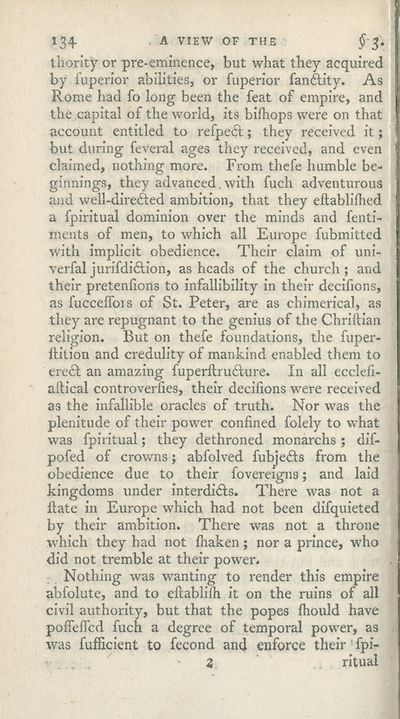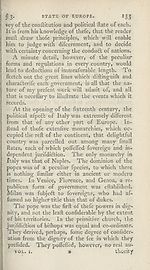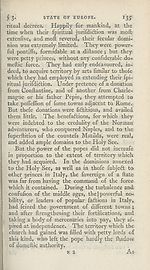Download files
Complete book:
Individual page:
Thumbnail gallery: Grid view | List view

134 A VIEW OF THE $ 3.
thority or pre-eminence, but what they acquired
by fuperior abilities, or fuperior fanftity. As
Rome had fo long been the feat of empire, and
the capital of the world, its bilhops were on that
account entitled to refpedt; they received it;
but during feveral ages they received, and even
claimed, nothing more. From thefe humble be¬
ginnings, they advanced with fuch adventurous
and well-direfted ambition, that they eftablifhed
a fpiritual dominion over the minds and fenti-
ments of men, to which all Europe fubmitted
with implicit obedience. Their claim of uni-
verfal jurifdiftion, as heads of the church ; and
their pretenfions to infallibility in their decifions,
as fucceffois of St. Peter, are as chimerical, as
they are repugnant to the genius of the Chriftian
religion. But on thefe foundations, the fuper-
ftition and credulity of mankind enabled them to
ere£t an amazing fuperftrudlure. In all eccleli-
altical controverfies, their decifions were received
as the infallible oracles of truth. Nor was the
plenitude of their power confined folely to what
was fpir itual; they dethroned monarchs ; dif-
pofed of crowns; abfolved fubjefts from the
obedience due to their fovereigns; and laid
kingdoms under interdicts. There was not a
Hate in Europe which had not been difquieted
by their ambition. There was not a throne
which they had not lhaken; nor a prince, who
did not tremble at their power.
Nothing was wanting to render this empire
abfolute, and to eftablilh it on the ruins of all
civil authority, but that the popes fhould have
poffeffcd fuch a degree of temporal power, as
was fufficient to fecond and enforce their fpi-
2 ritual
thority or pre-eminence, but what they acquired
by fuperior abilities, or fuperior fanftity. As
Rome had fo long been the feat of empire, and
the capital of the world, its bilhops were on that
account entitled to refpedt; they received it;
but during feveral ages they received, and even
claimed, nothing more. From thefe humble be¬
ginnings, they advanced with fuch adventurous
and well-direfted ambition, that they eftablifhed
a fpiritual dominion over the minds and fenti-
ments of men, to which all Europe fubmitted
with implicit obedience. Their claim of uni-
verfal jurifdiftion, as heads of the church ; and
their pretenfions to infallibility in their decifions,
as fucceffois of St. Peter, are as chimerical, as
they are repugnant to the genius of the Chriftian
religion. But on thefe foundations, the fuper-
ftition and credulity of mankind enabled them to
ere£t an amazing fuperftrudlure. In all eccleli-
altical controverfies, their decifions were received
as the infallible oracles of truth. Nor was the
plenitude of their power confined folely to what
was fpir itual; they dethroned monarchs ; dif-
pofed of crowns; abfolved fubjefts from the
obedience due to their fovereigns; and laid
kingdoms under interdicts. There was not a
Hate in Europe which had not been difquieted
by their ambition. There was not a throne
which they had not lhaken; nor a prince, who
did not tremble at their power.
Nothing was wanting to render this empire
abfolute, and to eftablilh it on the ruins of all
civil authority, but that the popes fhould have
poffeffcd fuch a degree of temporal power, as
was fufficient to fecond and enforce their fpi-
2 ritual
Set display mode to:
![]() Universal Viewer |
Universal Viewer | ![]() Mirador |
Large image | Transcription
Mirador |
Large image | Transcription
| Antiquarian books of Scotland > Kings & rulers > History of the reign of the Emperor Charles V. > Volume 1 > (152) |
|---|
| Permanent URL | https://digital.nls.uk/109184155 |
|---|
| Description | By William Robertson. London : Cadell and Davies, 1798. |
|---|---|
| Shelfmark | ABS.1.76.13 |
| Additional NLS resources: | |
| Description | Thousands of printed books from the Antiquarian Books of Scotland collection which dates from 1641 to the 1980s. The collection consists of 14,800 books which were published in Scotland or have a Scottish connection, e.g. through the author, printer or owner. Subjects covered include sport, education, diseases, adventure, occupations, Jacobites, politics and religion. Among the 29 languages represented are English, Gaelic, Italian, French, Russian and Swedish. |
|---|

